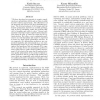Free Online Productivity Tools
i2Speak
i2Symbol
i2OCR
iTex2Img
iWeb2Print
iWeb2Shot
i2Type
iPdf2Split
iPdf2Merge
i2Bopomofo
i2Arabic
i2Style
i2Image
i2PDF
iLatex2Rtf
Sci2ools
121
click to vote
AAAI
1994
1994
Case-Based Acquisition of User Preferences for Solution Improvement in Ill-Structured Domains
1 We have developed an approach to acquire complicated user optimization criteria and use them to guide iterative solution improvement. The eectiveness of the approach was tested on job shop scheduling problems. The ill-structuredness of the domain and the desired optimization objectives in real-life problems, such as factory scheduling, makes the problems dicult to formalize and costly to solve. Current optimization technology requires explicit global optimization criteria in order to control its search for the optimal solution. But often, a user's optimization preferences are state-dependent and cannot be expressed in terms of a single global optimization criterion. In our approach, the optimization preferences are represented implicitly and extensionally in a case base. Experimental results in job shop scheduling problems support the hypotheses that our approach (1) is capable of capturing diverse user optimization preferences and re-using them to guide solution quality improv...
AAAI 1994 | Intelligent Agents | Optimization Criteria | Optimization Preferences | Shop Scheduling Problems |
| Added | 02 Nov 2010 |
| Updated | 02 Nov 2010 |
| Type | Conference |
| Year | 1994 |
| Where | AAAI |
| Authors | Katia P. Sycara, Kazuo Miyashita |
Comments (0)

